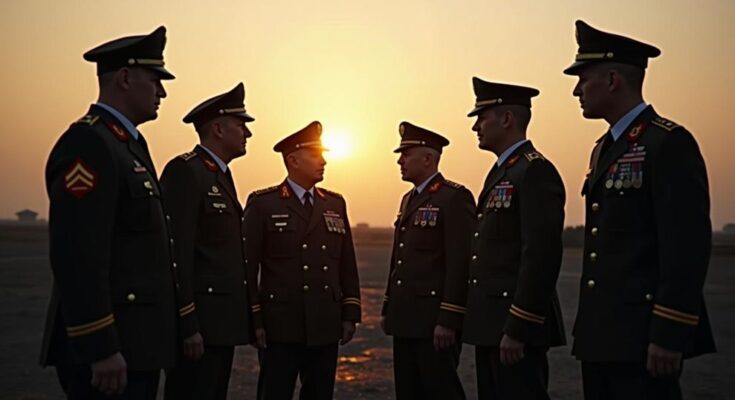Israeli airstrikes in Lebanon have led to the deaths of seven senior Hezbollah officials, including leader Hassan Nasrallah. This escalation intensifies existing tensions in the Middle East as Hezbollah, having lost significant figures, grapples with the implications for its future leadership and operations. This military action marks a critical point in the conflict between Israel and Hezbollah, prompting major concerns within Lebanon and the region.
In the span of a week, Israeli airstrikes in Lebanon have resulted in the deaths of seven senior officials and commanders of Hezbollah, a powerful militant group. Notably, the strikes claimed the life of Hassan Nasrallah, the long-standing leader of Hezbollah since 1992, who played a pivotal role in transforming the group into a significant military and political force in Lebanon. Alongside him, several key figures were also killed, including Nabil Kaouk, the deputy head of Hezbollah’s Central Council; Ibrahim Akil, a commander of the Radwan Forces; Ahmad Wehbe, another prominent commander of the same forces; and others involved in various military capacities, including administration of key units such as drones and missiles. This escalation marks a critical phase in the ongoing conflict between Israel and Hezbollah, reflective of increased tensions following Hezbollah’s support for Hamas amid the latest Gaza conflict. The situation has catalyzed significant concern within Lebanon and the broader Middle East, as the loss of such senior officials represents a substantial blow to Hezbollah, which has been a dominant power in Lebanon’s military landscape since the early 1980s. Amidst the chaos, Hezbollah’s remaining leadership, including Naim Kassem and Hashim Safieddine, are under increased scrutiny as potential successors to Nasrallah, while the search for their strategic stability continues against the backdrop of intensified Israeli efforts to neutralize the group.
The recent Israeli military actions represent a significant escalation in the ongoing conflict within the Middle East, particularly concerning Hezbollah’s involvement and its historical antagonism with Israel. Hezbollah, established in the early 1980s, emerged as a response to the Israeli invasion of Lebanon. Over the decades, it has evolved from a mostly paramilitary organization into a formidable political and military power, with Nasrallah at its helm during pivotal conflicts with Israel. The group has significantly influenced regional dynamics, including its support for Syrian President Bashar Assad during the Syrian Civil War and active engagement with Iran and other militant factions across the region. The latest Israeli strikes, targeting key figures within the Hezbollah hierarchy, raise questions about the future structure and strategy of the group and the potential ramifications for Lebanon and the surrounding regions.
The assassination of seven high-ranking Hezbollah officials, especially the loss of Hassan Nasrallah, significantly alters the landscape for the militant group and the broader geopolitical tensions in the Middle East. As these developments unfold, the remaining leadership’s ability to navigate this crisis will be crucial for Hezbollah’s resilience and its ongoing role in regional conflicts. The situation remains precarious as Israel intensifies its military operations against perceived threats, leaving Lebanon’s military and political stability uncertain.
Original Source: www.whec.com




